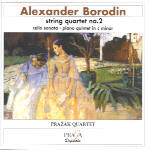The efforts of the Prague-based Prazák Quartet are sabotaged by Praga’s engineers who provide it with brittle sound that thins ensemble, puts an upper treble haze around the cello in the sonata, and lends a metallic touch to the first violin when the disc is played at realistic volume levels. Listening through such archetypal digital artifacts reveals fetching performances of Borodin’s chamber music that nevertheless have been bettered elsewhere. The popular Quartet No. 2 is something of a staple, thanks to its sinuous, sensuous Notturno movement, sweetly sung by the Prazáks. Their fine reading fails to erase memories of the old Quartetto Italiano classic of the analog era that’s still the gold standard. The lesser known early works are worth hearing too, though cellist Ottó Kertész’s more incisive, rich-toned realization of the youthful Cello Sonata on Marco Polo has fewer longeurs than Michal Kanka’s more expansive, spare-toned version here. The same holds for the Piano Quintet where, despite Jaromir Klepác’s crisp pianism, slower tempos and an analytic recording tip the balance in favor of the New Budapest Quartet’s urgent, more Romantic Marco Polo recording.
If you want to explore a representative sampling of Borodin’s chamber music, this Prazák disc is a reasonable option, but the Marco Polo offers two of the three works in better performances and replaces the Quartet, which is available in several fine recordings, with the early String Quintet.
































